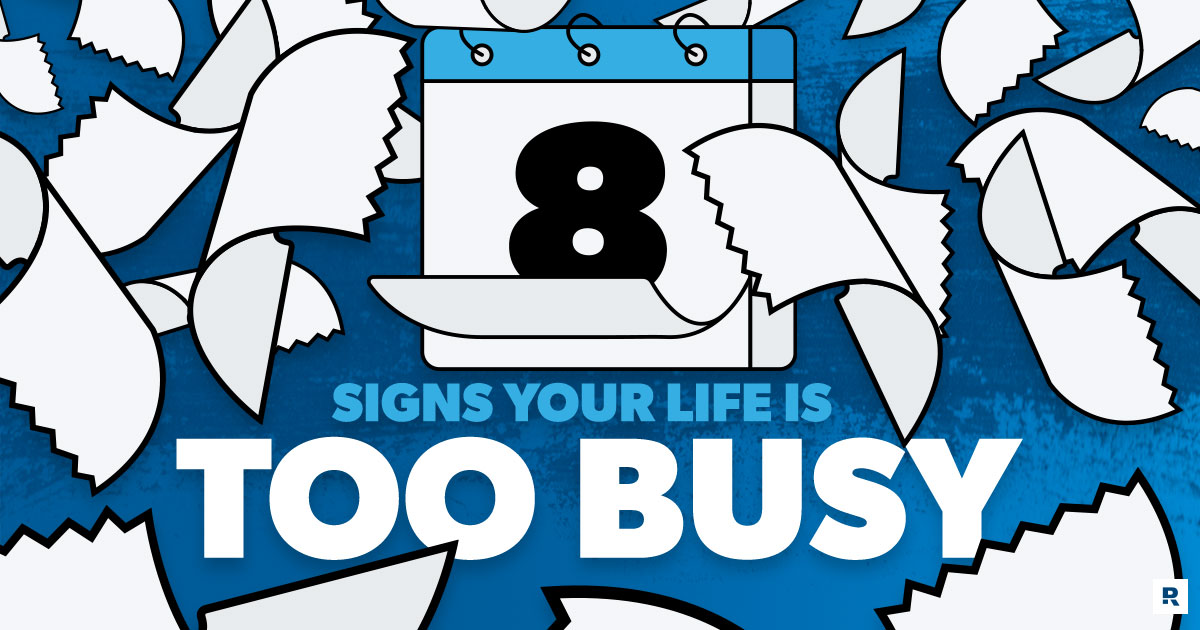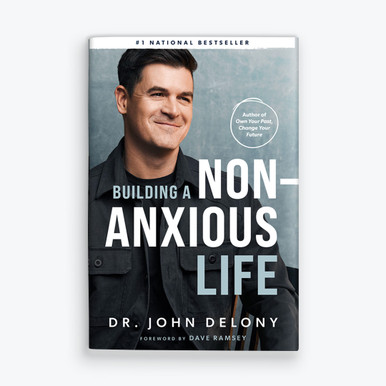
It happens all the time. We run into a friend at the grocery store or pass a coworker in the hallway. They ask, “How are you? How’s life?”
And we respond, “Busy.”
But we aren’t just busy—we’re too busy. So many of us are living our lives at 100 mph and feeling burned out. We have ridiculous expectations for ourselves and, to make matters worse, busyness is often celebrated in our high-achieving, fast-paced culture.
Now, hard work is a good thing. We don’t want to be lazy. But there’s a fine line between being productive and being unhealthy.
So, how do you know when you’ve crossed that line? Here are eight signs that will help you honestly acknowledge if you’re too busy.
1. You’re always trying to multitask.
If you’re eating cereal, putting on makeup, and listening to a podcast on your morning commute, you’re too busy. If you’re checking your email while sitting at the dinner table and asking your kids about their day, you’re too busy.
Sadly, this is how most of us live our lives. And it’s a terrible idea.
Why? Because brain researchers agree multitasking is a bad way to manage your time, since doing several things at once damages your ability to focus, learn and be present.1
Even so, it won’t be easy to overcome the multitasking habit. One study analyzed the habits of 50,000 workers and found that, on average, people spend 40% of their time multitasking on communication tools, like Slack and email.2
So, what exactly can you do about it?
- Focus on one thing at a time. Here’s an idea: For one week, commit to doing only one thing at a time and see how much mental clarity that gives you.
- Leave your work at work. That means no checking emails or preparing for meetings when you’re at home. When you’re off, you need to act like it and start enjoying some peace in the afternoon and during the weekend.
2. You’re exhausted and overwhelmed.
When we’re too busy, sleep is one of the first things to go because we have this dumb (and wrong) belief in our culture that sleep is optional. For some reason, we idolize successful CEOs who brag about averaging four hours of sleep a night (who knows how much coffee they drink to keep from nodding off during the day).
Sleep isn’t optional though. We desperately need sleep—it’s like a daily power wash for our brains.
Here’s a crazy thought: What if you actually felt rested when you woke up in the morning? What if you didn’t have to be overwhelmed by your thoughts because you had enough energy to sort through them? You can!
Here’s how:
- Make sleep a priority. Get seven to nine hours of sleep every single night. Research shows sleep deprivation is linked to increased stress, heart disease, cancer and even Alzheimer’s disease.3
- Total up the hours. You get 168 hours in a week. That’s it. Get out your calendar and do some math. Add up the time you spend sleeping, working and doing other essential tasks every week. Then, add up your extra commitments. Do you have enough time to get the sleep you need? If not, it’s time to make some changes.
3. You have to schedule things weeks in advance.
When you and your friends are trying to plan a time to get together, does it feel like you have to do a calculus equation to get your schedules to line up? Is your calendar so full it’s on the verge of erupting like Mount Vesuvius? If so, you’re probably too busy.
Here’s what to do about it:
- Schedule free time. When you sit down to plan your week or month, schedule free time to create margin. Don’t squeeze commitments in every hour of the day and every night of the week. Scheduling free time allows you to rest!
- Say no to being overcommitted. If you’ve got plans every weeknight, take a hard look at your calendar and see if there’s anything you can get off your plate to create more space for downtime.
4. You have a hard time focusing and enjoying the moment.
It’s amazing how much time we spend on our devices catching up on other people’s lives, being hooked by the news, or scrolling numbly through our social apps. The average person spends a whopping 3 hours and 43 minutes a day on their mobile device.4
When we spend that much time with our eyes glued to a screen, it’s difficult to focus on and enjoy what’s going on around us. Even when we’re not using a device, it’s still easy to let our thoughts wander. We worry about things that have already happened or things that might happen in the future.
Luckily, you can learn to focus our thoughts on what’s happening right in front of you. It takes effort though.
Here’s where you can start:
- Learn to control wandering thoughts. Here’s a challenge: Pause for a second and use your imagination to pretend there’s an elephant sitting in a metal folding chair across the room from you. Could you do it? If so, you just proved to yourself you can control your thoughts. So start doing it more consistently and intentionally!
- Read Building a Non-Anxious Life. Mental health expert and Ramsey Personality Dr. John Delony wrote a book about anxiety—what it is and what it isn’t. If you struggle with racing thoughts and have difficulty enjoying the moment, you might also be dealing with anxiety. This book can help.
Building a Non-Anxious Life
5. You never take time off.
If you never take breaks, usually work through lunch, or don’t remember the last time you had a day to “do nothing,” you’re too busy. (You’ve also probably forgotten how important it is to slow down.)
It’s time to stop running on overdrive and start enjoying some rest. After all, the world isn’t going to fall apart if you take a nap or if you don’t cross off all 400 things on your to-do list today. It’s just not.
If you never prioritize rest, it’s probably time to . . .
- Step away from work. If you get PTO at work, use it! Plan a vacation (or staycation) to unwind and connect with your family. If you’re self-employed or have a nontraditional work schedule, talk to your spouse or a friend about creative ways you can take time off.
- Leave work at work. Yep, we did already talk about this one, but it’s that important. You’ve got to set this really important boundary.
6. You feel out of balance.
The feeling of being out of balance is hard to put into words, but you know it when you feel it. Life just starts to seem a little bit off.
Here’s the thing about balance: It isn’t about doing everything for an equal amount of time. It’s about doing the right things at the right time. And when you’re too busy, chances are, you’re not even sure what the “right things” are.
So, how can you find balance?
- Ask yourself, What is most important to me? The starting point to finding balance is knowing what’s most important so you can focus your time and energy on those things or people or tasks.
- Own your version of balance. Balance will look different for you than it will for your best friend, your coworker or even your spouse. That’s okay. In fact, that’s how it should be.
7. You feel guilty a lot of the time.
One of the side effects of being too busy and out of balance is guilt. When you aren’t clear on what actually matters, it’s easy to feel bad about how you spend our time.
What to do about guilt:
- Understand where the guilt is coming from. A lot of the time, it doesn’t even come from other people. Dig deep into that feeling of guilt. Do you have ridiculous expectations of yourself? Do you feel over-the-top pressure at work? Are you trying to be a superhero?
8. You’re filling your calendar with things you don’t even want to do.
This is the worst, isn’t it? We’ve all said yes to so many things we didn’t want to do. Maybe you agreed to coach your son’s soccer team or help messy kindergarteners at your church glue pieces of construction paper together.
There are a lot of reasons you sign up for stuff like that. Sometimes, you’re afraid of looking like a failure. Other times, you feel like you need to be Superman and carry the world on your shoulders.
But here’s what you’ve got to understand: You control what goes on your calendar. Period. Almost always, you get to decide how you spend your time.
So, if you want to change your level of busyness, it starts by taking responsibility for those choices.
That may include:
- Being honest with yourself. Pull out your calendar and take a look at every single thing you do throughout the week. Now answer this question honestly: Is this how you want to spend your time?
- Getting in touch with your motives. Why do you say yes to things you don’t want to do? It’s definitely good to want to serve others and be generous with your time, but you’ve got to be careful to say yes for the right reasons.
Learn to Protect Your Time
The main thing to understand is this: You’ve got one wonderful life, and you shouldn’t spend it waking up every morning feeling exhausted and defeated before the day even begins. If you’re too busy, take it seriously—because how you spend your time is how you spend your life.
Three Steps to Put an End to Busyness
- Grab a pen and some paper to start journaling about what’s going on in your life—and what you’d like to change.
- Schedule an appointment with a counselor or pastor you trust. They can give you support as you make changes to your schedule and priorities.
- Take Dr. John Delony’s free anxiety test to see which areas of life might be contributing to your feelings of stress and anxiety.



